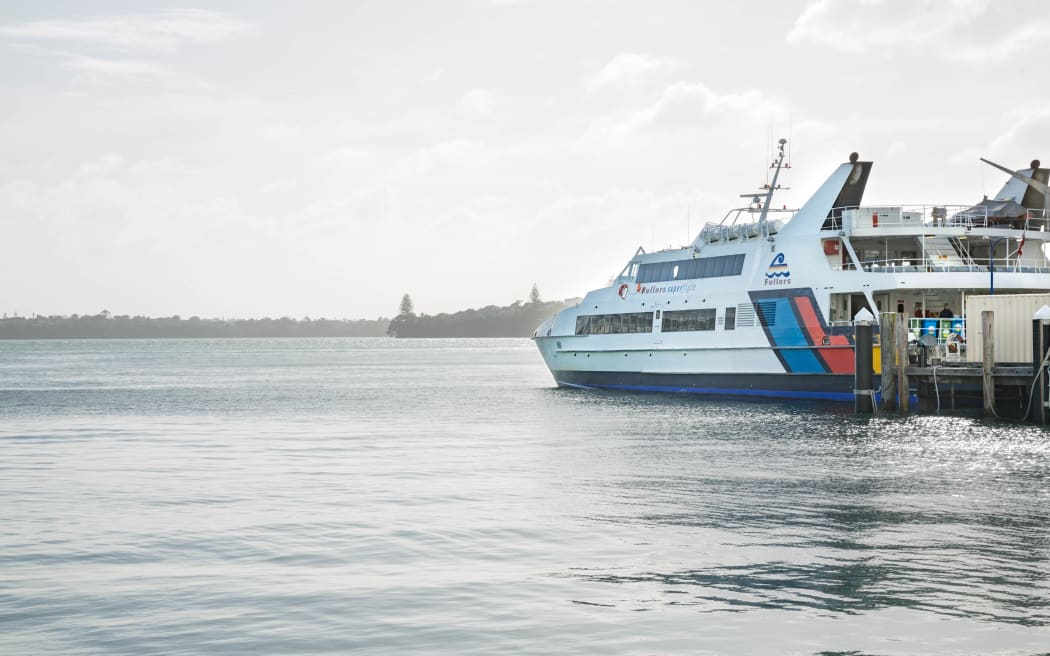
(file image) Photo: RNZ / Cole Eastham-Farrelly
Fullers ferries are working on hiring skilled staff, upping uncompetitive pay rates and battling immigration hurdles, the company's boss says, after some Auckland services were cut due to staff shortages.
It comes after mass cancellations of Auckland Fuller360 ferry services earlier this year.
From October, they will no longer run the Birkenhead, Te Onewa Northcote Point, and Bayswater services, leaving Auckland Transport (AT) scrambling to find a replacement operator. Significant cuts were also planned to the timetable on the Gulf Harbour and Half Moon Bay routes.
AT said Fullers quit the routes so it could accelerate a staff training programme, because the company was short of 12 crews.
But Fullers chief executive Mike Horne insisted AT had known for months that this was coming.
"No, we didn't quit. We certainly came to the end of the contract. If we'd had the ability to keep extending for another two years ... that would have been ideal for everybody. But ... we were unable to."
Staff shortages were "the fundamental reason" for not being able to keep servicing those routes, he said.
"There were literally a lot of people that left and made different decisions over Covid, and the reality is it's crew with seven to 10 years' experience, not one or two or three or four.
"This is something that we've been clearly talking ... about for the last six, 12 months, and this goes right back to discussions at a government level - if you recall, we were talking to Michael Wood about this."
In March this year, following mass cancellations of Fullers ferry services due to staff shortages, then immigration minister Michael Wood called a crisis meeting with Fullers, Auckland Transport and Waka Kotahi, after which, skippers and deckhands were added to the green list for visas.
"We've been working really hard on this, and there's a lot of progress that's been made," Horne said.
"This industry issue is not a short-term fix.
"We've worked through the immigration side of things, we're working through the wage increase to be internationally competitive, and we're working through the accelerated training piece as well - which to be fair we would have liked to have started six months ago, but simply were unable to.
"We've got lots and lots of people at the entry level, we're fully staffed, and we have progressed or signed off ... 550 people in the last seven months. What we need to do to get everything back up and running is sign off 2000 people across the same length of time - this is all about training and skills.
"So the accelerated programme that Auckland Transport and ourselves are now working together on - which is really important - allows us to get back to that point ... we're progressing our deckhands to skippers and we're progressing our small-boat skippers to large-boat skippers."
Horne said the pay rates it offered for skilled mariners were "25 percent under what you'd get in Australia. And we're still working with government as to how we resolve that."
The company wanted the government to fund an increase in their pay rates: "For contracted services, absolutely. For commercial services we pick that up ourselves. That's a big increase, and that's what we're strongly advocating and working towards."
They wanted to add another $30 an hour for a skipper to put their pay at about $140,000 a year, he said.
Though immigration rules were still a problem, he said.
"The other thing is it's always been about immigration as well, and getting short-term very skilled people in as quickly as we can. There's three or four [highly-skilled staff] we've got in recently, but there's a long way to go with that as well.
"It's still around visa processing times, particularly with families. So those settings, apart from being on the green list, the rest of it actually hasn't changed.
"The other part ... is the qualifications from overseas do not match the qualifications in New Zealand, so there's another delay around that as we have to work through individually those qualifications."
In March, Fullers told Checkpoint they were 50 staff down, so did they begin work on staff retention and succession planning early enough to avoid a crisis situation? Horne said they had been working on the problem for 18 months.
In March, Horne told Checkpoint that if the government loosened immigration regulations, the Coromandel Peninsula could have its ferry service back. However, after the immigration regulations were loosened, there was still no return in sight for the Coromandel service.
Horne said there was also no plan for the Rotorua summer ferry service to be restarted, and all charter work and 'destination tourist' work was also on hold for the company.
"Where we're doing the accelerated training at the moment, that's to get contracted services with AT back to where they need to be. We're working really hard to get those back.
"[We need people who are] skilled - seven to 10 years [of experience]. It's a long-burn in terms of getting what we need back into the country and training people up. So this is not just a Fullers issue, this is an industry issue."
When asked if Fullers had delivered a substandard service and let their Auckland customers down, he disagreed.
"I challenge anyone to look at who else is doing it better than we are in New Zealand at this point. We're working really hard."

